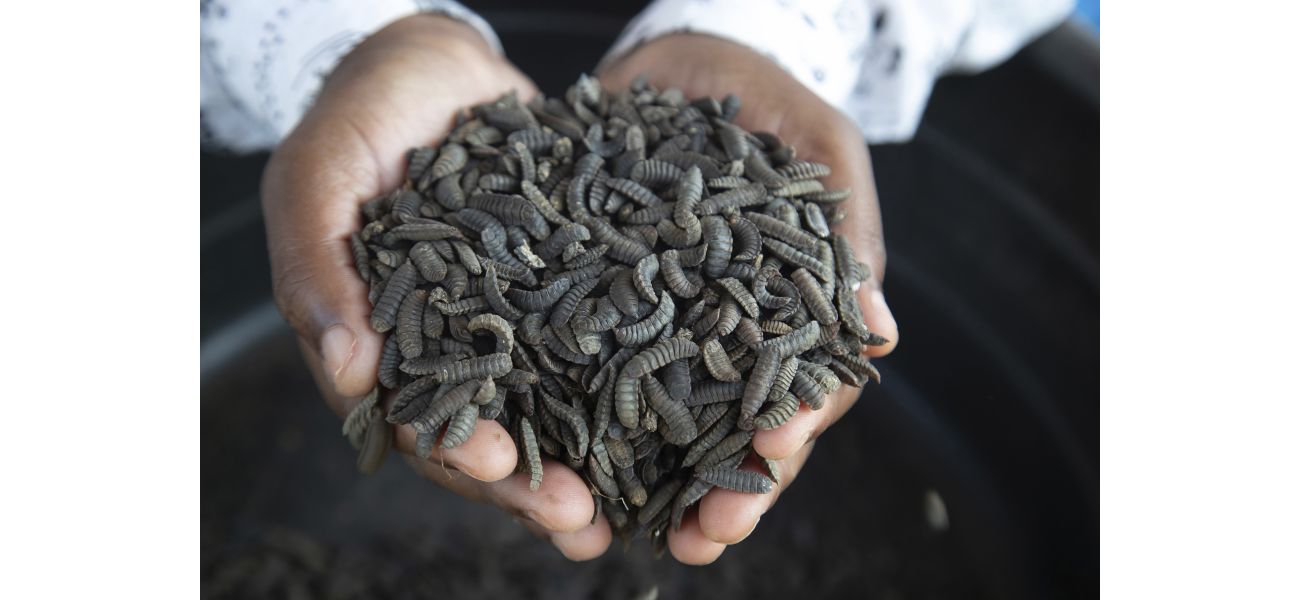Zimbabwe farmers are using maggots to endure drought and prosper.
Initially, farmers in southeastern Zimbabwe were hesitant about the idea of farming maggots due to a recent drought that destroyed their main crop of corn.
November 30th 2024.

When Mari Choumumba and other farmers in Nyangambe, a region in southeastern Zimbabwe, first heard about the idea of farming maggots, they were spooked. After all, their staple crop of corn had been wiped out by a devastating drought. Plus, with multiple outbreaks of cholera in the southern African nation due to extreme weather and poor sanitation, flies were usually seen as a nuisance to be exterminated, not bred.
Choumumba recalls a community meeting where experts from the government and the United States Agency for International Development (USAID) brought up the suggestion. People had gathered in the hopes of receiving news about food aid, but many were taken aback when they learned that the meeting was about training on farming maggots for animal feed and garden manure.
"People were like, 'What? These are flies, flies bring cholera'," Choumumba said. The idea was met with skepticism and fear, but a year later, Choumumba walks with a smile to a smelly cement pit covered by wire mesh where she feeds rotting waste to maggots - her new source of income.
After harvesting the insects about once a month, Choumumba turns them into protein-rich feed for her free-range chickens. This not only provides food for her family, but she also sells the chickens and their eggs for profit. Before taking up maggot farming, up to 80 per cent of chicken production costs were spent on feed. This was a major burden for rural farmers who couldn't afford the expensive store-bought feed.
But with maggot farming, production costs are reduced by about 40 per cent, according to Francis Makura, a specialist with a USAID program aimed at expanding revenue streams for farmers affected by climate change. The maggots are offspring of the black soldier fly, which is not known to spread disease. Their life cycle lasts only a few weeks, during which they lay between 500 and 900 eggs. The larvae feed on decaying organic matter and turn it into a rich protein source for livestock.
"It is even better than the crude protein we get from soya," said Robert Musundire, a professor specializing in agricultural science and entomology at Chinhoyi University of Technology in Zimbabwe. The university breeds the insects and helps farmers with breeding skills. Donors and governments have been promoting black soldier fly maggot farming in Africa due to its low labor and production costs, as well as its potential benefits to agriculture - the continent's main industry that is under pressure from climate change and conflicts.
In Uganda, maggots helped alleviate a fertilizer crisis caused by the war in Ukraine. In Nigeria and Kenya, they have become a commercial success. In Zimbabwe, the government and partners initially piloted the project among farmers struggling to secure soya meal for their animals. Later, a World Bank-led project used it as a recovery effort for communities affected by a devastating cyclone in 2019.
Now, maggot farming is becoming a lifesaver for some communities in the country of 15 million people, where repeated droughts make it difficult to grow corn. It's not clear how many people across the country are involved in maggot-farming projects, but Musundire says that initially, only "a mere five per cent" of farmers he approached were interested. Now, that number has increased to "about 50 per cent" as people have come to understand the benefits of using maggots as a protein source and the fact that they do not transmit diseases.
The "yuck factor" was initially a concern, but necessity prevailed, according to Musundire. With the drought decimating crops and big livestock such as cattle, which are a symbol of wealth and a source of labor, small livestock like chickens are helping communities recover more quickly. "They can fairly raise a decent livelihood out of the resources they have within a short period of time," Musundire said.
Maggot farming not only benefits farmers financially, but it also has positive environmental impacts. In Zimbabwe, about 1.6 million tons of waste is produced annually, 90 per cent of which can be recycled or composted, according to the country's Environmental Management Agency. By feeding this waste to maggots, greenhouse gas emissions can be reduced in a country where garbage collection is unreliable.
At a plot near the university, Musundire and his students run a maggot breeding center in the city of 100,000 people. The project collects over 35 metric tons of food waste each month from various sources such as the university's canteens, vegetable markets, supermarkets, abattoirs, food processing companies, and beer brewers. "Food waste is living, it respires, and it contributes to the generation of greenhouse gases," Musundire explained.
According to the UN Food and Agriculture Organization, food loss and waste account for eight to ten per cent of global greenhouse gas emissions, which is about five times more than the aviation sector. The university project converts about 20-30 metric tons of waste into livestock protein or garden manure in just two weeks.
Choumambo, who has been able to turn her small farm into a profitable venture through maggot farming, often faces criticism and ridicule from her community as she collects waste to feed her maggots. However, she sees the potential in this unconventional method and is determined to prove her doubters wrong. "I tell them we have a good use for it, it is food for our maggots," she said.
Choumambo is one of 14 women in her village who have taken up the project, and she never imagined that she would be able to survive and support her family through farming maggots. But with determination and hard work, she has turned her farm into a successful business. "Many people would puke at the sight and the stench," she said, while mixing rotting vegetables, corn meal, and other waste in a tank. "But this is the sweet smell of food for the maggots, and for us, the farmers."
Choumumba recalls a community meeting where experts from the government and the United States Agency for International Development (USAID) brought up the suggestion. People had gathered in the hopes of receiving news about food aid, but many were taken aback when they learned that the meeting was about training on farming maggots for animal feed and garden manure.
"People were like, 'What? These are flies, flies bring cholera'," Choumumba said. The idea was met with skepticism and fear, but a year later, Choumumba walks with a smile to a smelly cement pit covered by wire mesh where she feeds rotting waste to maggots - her new source of income.
After harvesting the insects about once a month, Choumumba turns them into protein-rich feed for her free-range chickens. This not only provides food for her family, but she also sells the chickens and their eggs for profit. Before taking up maggot farming, up to 80 per cent of chicken production costs were spent on feed. This was a major burden for rural farmers who couldn't afford the expensive store-bought feed.
But with maggot farming, production costs are reduced by about 40 per cent, according to Francis Makura, a specialist with a USAID program aimed at expanding revenue streams for farmers affected by climate change. The maggots are offspring of the black soldier fly, which is not known to spread disease. Their life cycle lasts only a few weeks, during which they lay between 500 and 900 eggs. The larvae feed on decaying organic matter and turn it into a rich protein source for livestock.
"It is even better than the crude protein we get from soya," said Robert Musundire, a professor specializing in agricultural science and entomology at Chinhoyi University of Technology in Zimbabwe. The university breeds the insects and helps farmers with breeding skills. Donors and governments have been promoting black soldier fly maggot farming in Africa due to its low labor and production costs, as well as its potential benefits to agriculture - the continent's main industry that is under pressure from climate change and conflicts.
In Uganda, maggots helped alleviate a fertilizer crisis caused by the war in Ukraine. In Nigeria and Kenya, they have become a commercial success. In Zimbabwe, the government and partners initially piloted the project among farmers struggling to secure soya meal for their animals. Later, a World Bank-led project used it as a recovery effort for communities affected by a devastating cyclone in 2019.
Now, maggot farming is becoming a lifesaver for some communities in the country of 15 million people, where repeated droughts make it difficult to grow corn. It's not clear how many people across the country are involved in maggot-farming projects, but Musundire says that initially, only "a mere five per cent" of farmers he approached were interested. Now, that number has increased to "about 50 per cent" as people have come to understand the benefits of using maggots as a protein source and the fact that they do not transmit diseases.
The "yuck factor" was initially a concern, but necessity prevailed, according to Musundire. With the drought decimating crops and big livestock such as cattle, which are a symbol of wealth and a source of labor, small livestock like chickens are helping communities recover more quickly. "They can fairly raise a decent livelihood out of the resources they have within a short period of time," Musundire said.
Maggot farming not only benefits farmers financially, but it also has positive environmental impacts. In Zimbabwe, about 1.6 million tons of waste is produced annually, 90 per cent of which can be recycled or composted, according to the country's Environmental Management Agency. By feeding this waste to maggots, greenhouse gas emissions can be reduced in a country where garbage collection is unreliable.
At a plot near the university, Musundire and his students run a maggot breeding center in the city of 100,000 people. The project collects over 35 metric tons of food waste each month from various sources such as the university's canteens, vegetable markets, supermarkets, abattoirs, food processing companies, and beer brewers. "Food waste is living, it respires, and it contributes to the generation of greenhouse gases," Musundire explained.
According to the UN Food and Agriculture Organization, food loss and waste account for eight to ten per cent of global greenhouse gas emissions, which is about five times more than the aviation sector. The university project converts about 20-30 metric tons of waste into livestock protein or garden manure in just two weeks.
Choumambo, who has been able to turn her small farm into a profitable venture through maggot farming, often faces criticism and ridicule from her community as she collects waste to feed her maggots. However, she sees the potential in this unconventional method and is determined to prove her doubters wrong. "I tell them we have a good use for it, it is food for our maggots," she said.
Choumambo is one of 14 women in her village who have taken up the project, and she never imagined that she would be able to survive and support her family through farming maggots. But with determination and hard work, she has turned her farm into a successful business. "Many people would puke at the sight and the stench," she said, while mixing rotting vegetables, corn meal, and other waste in a tank. "But this is the sweet smell of food for the maggots, and for us, the farmers."
[This article has been trending online recently and has been generated with AI. Your feed is customized.]
[Generative AI is experimental.]
0
0
Submit Comment





